Allergic Reactions Symptoms
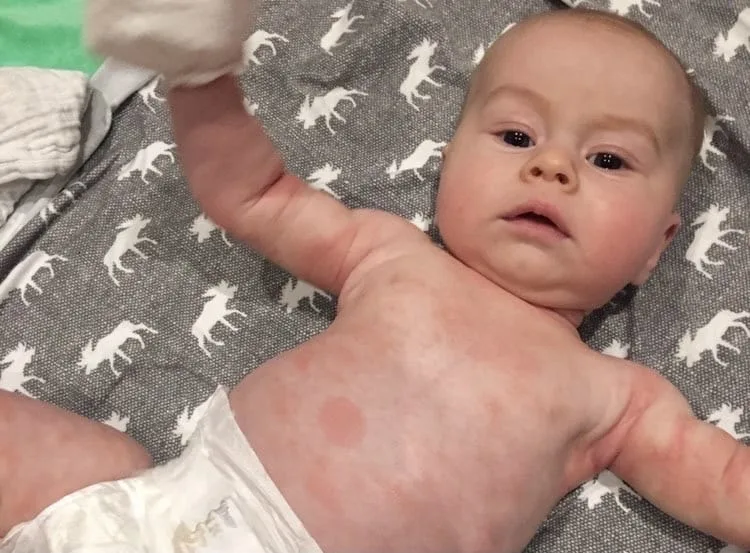
Runny nose, rashes, hives—these are just some of the symptoms of allergic reactions, which can occasionally be life threatening. Our pediatric pros explain the signs to look out for, share images of reactions, and offer guidance on what to do if an allergic reaction occurs.
Need help starting solids? The Solid Starts App can help you navigate first bites and beyond.
Is my baby having an allergic reaction?
Allergic reactions to food typically occur within two hours of consuming the allergenic food--and often begin within minutes. There is, however, a small percentage of babies who may experience a delayed allergic reactions, typically due to FPIES.
Generally, the more of the allergen consumed, the more severe the reaction is likely to be, so it is important to start small when introducing new foods. Lastly, baby may not have an allergic reaction the first time they are exposed to the food, so be watchful on the second and subsequent exposures.
**If you think baby is having an allergic reaction, call emergency services immediately.**
What are signs of food allergies in babies?
Symptoms of an allergic reaction vary from baby to baby, and can range from mild to severe. Generally, the severity of a reaction is judged by how many symptoms are present and the severity of those symptoms. Before introducing allergens, it is important to know how to recognize the signs of an allergic reaction.
Symptoms of mild allergic reactions:
Mild symptoms of an allergic reaction can include ONE of the following (more than one would constitute a more severe reaction):
Itchy or runny nose, sneezing
Itchy mouth
A few isolated hives, mild itching
Mild nausea or gastrointestinal discomfort, or a single episode of vomiting
If you note any of the above symptoms, stop feeding the allergen and contact your pediatrician, family practitioner, or allergist for guidance. If your child is having multiple symptoms, call 9-1-1/local emergency services immediately and request an ambulance equipped with epinephrine.


Symptoms of severe allergic reactions in babies:
More severe reactions may include any of the following, either alone or in combination:
Shortness of breath, wheezing, repetitive cough
Pale, ashen or bluish skin
Swelling of face, lips, or tongue
Widespread hives on body
Repetitive vomiting or diarrhea
Sudden tiredness/lethargy/seeming limp
If your child is having any of the above symptoms, call 9-1-1/local emergency services immediately and request an ambulance equipped with epinephrine. Do not wait.
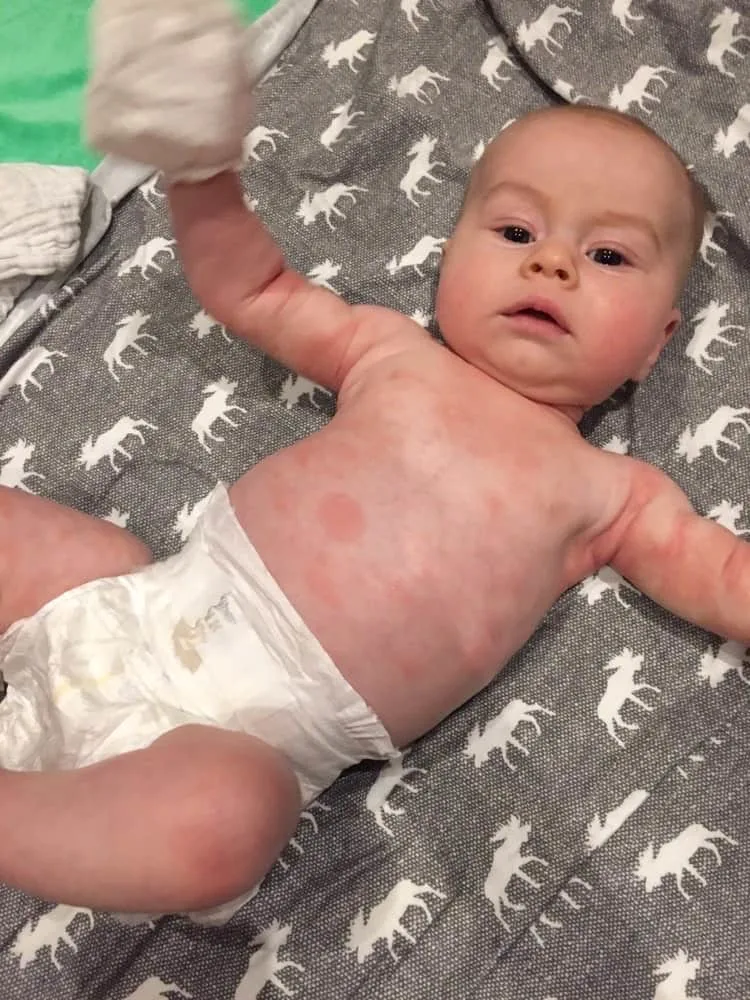


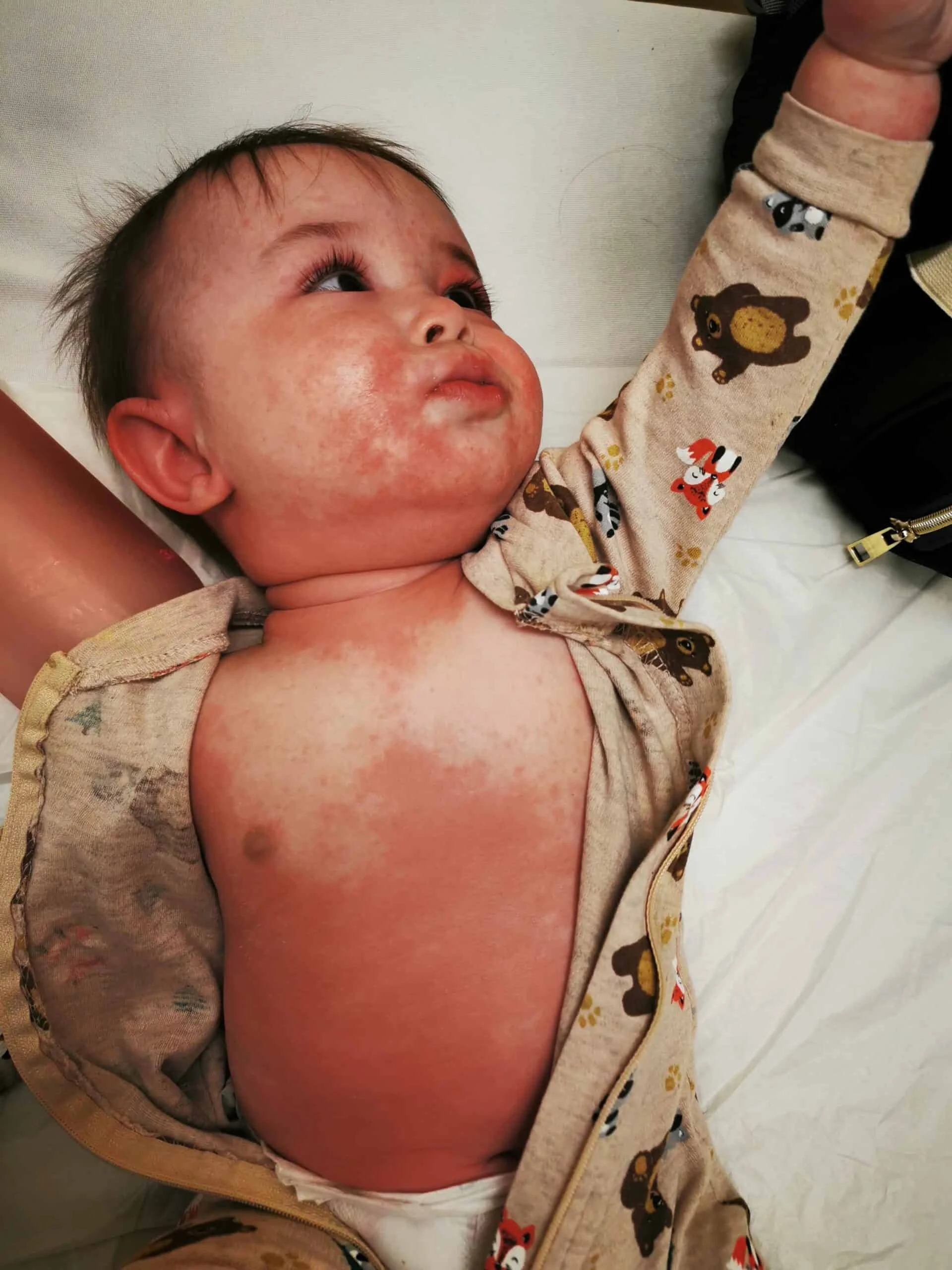


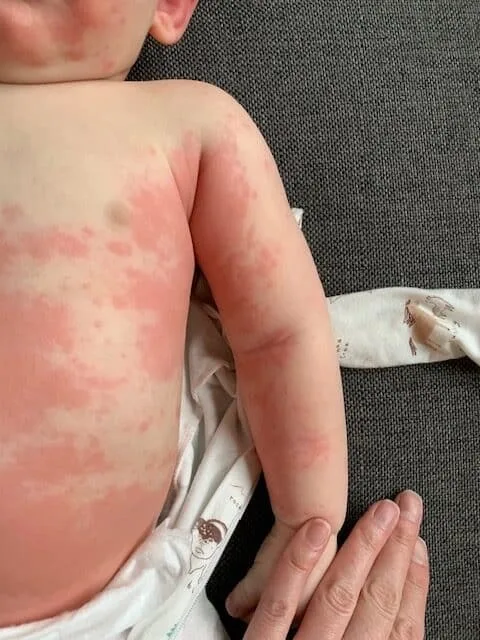
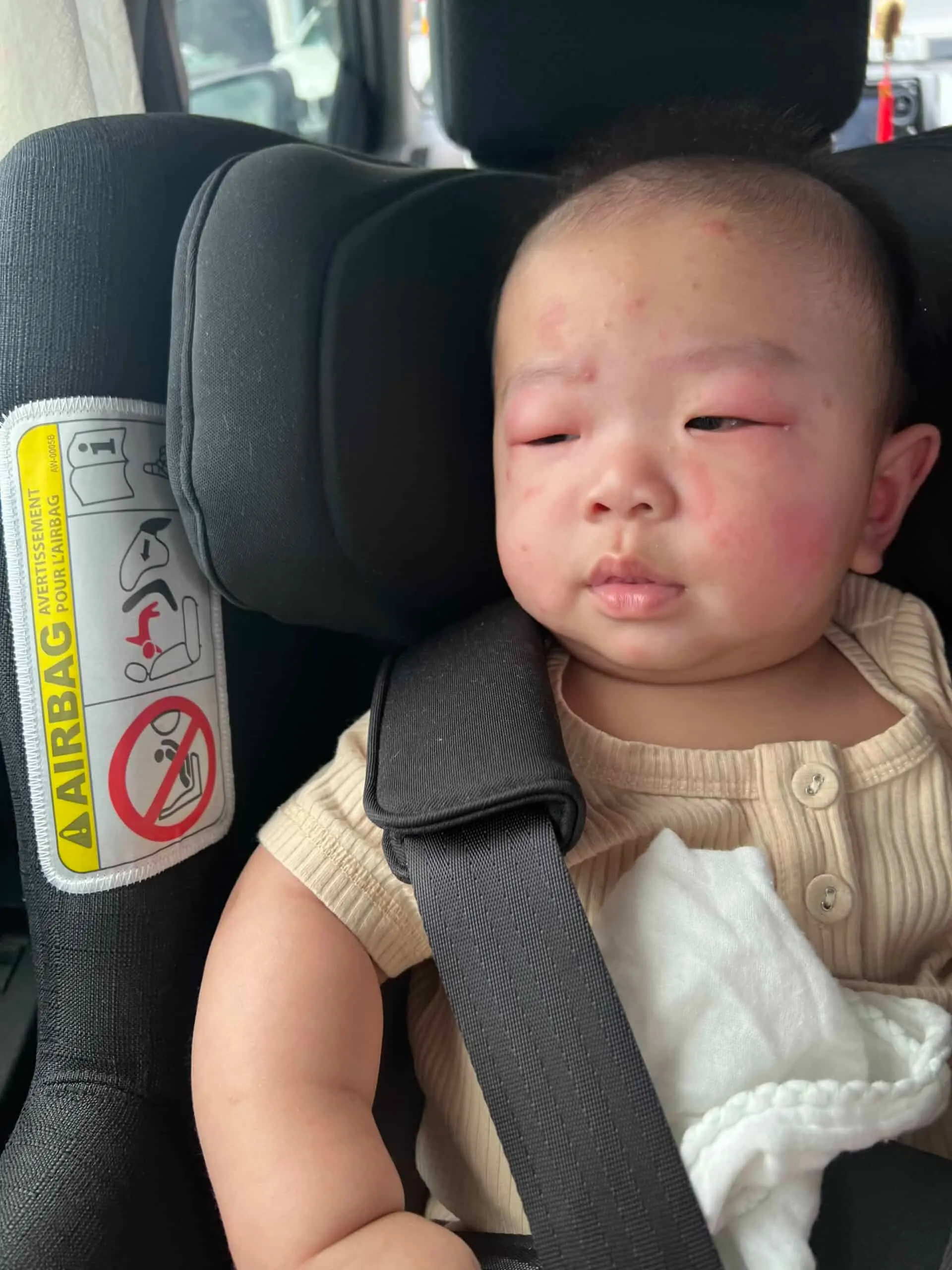
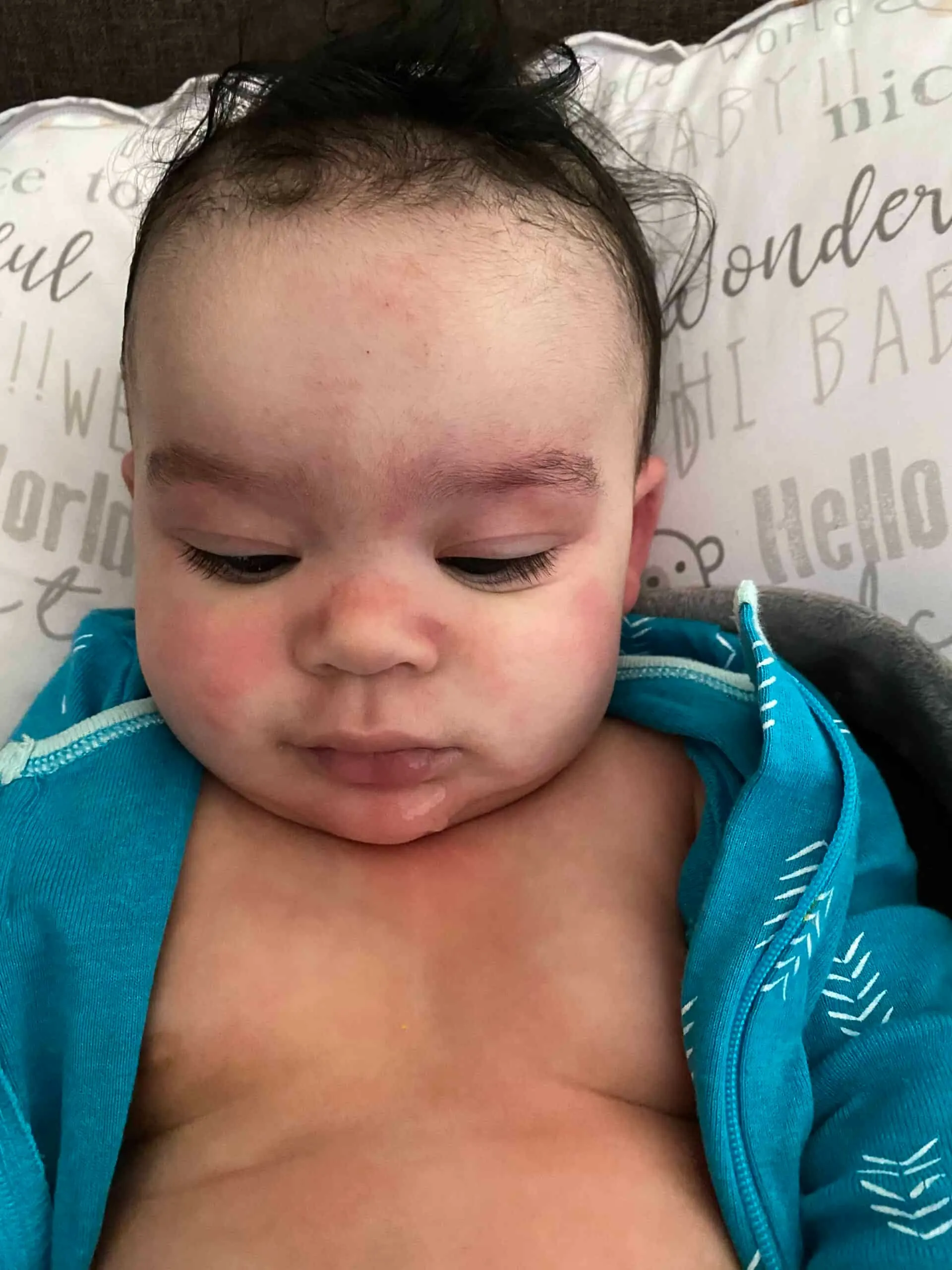

How to Administer Epinephrine to Babies & Toddlers
How to administer epinephrine to babies
Delayed symptoms & FPIES
FPIES (Food Protein-Induced Enterocolitis Syndrome) is a type of food allergy in children that can be severe and life-threatening. Unlike most allergic reactions (which can occur within minutes), FPIES allergic reactions occur within hours after consuming a particular food. For this reason, FPIES is sometimes known as a delayed food allergy. The most common food culprits of FPIES are cow’s milk products (such as formula), soy, oats, and rice, followed by other foods such as avocado, banana, barley, eggs, green beans, peas, meats, poultry, seafood, squash, and sweet potatoes. FPIES is extremely rare in exclusively-breastfed infants.
The classic presentation of FPIES is an infant who recently switched from breast milk to formula or has started solid food. Baby typically begins vomiting between 1 to 4 hours and may also begin experiencing diarrhea between 5 to 10 hours after ingesting the trigger food. Other symptoms include low blood pressure, low body temperature, extreme pallor, repetitive vomiting, and significant dehydration. Thankfully, most cases of FPIES will completely resolve during toddlerhood. Babies with FPIES should be in the care of an allergist/immunologist and are best served by a multidisciplinary team that also includes their general pediatrician or family practitioner, a pediatric gastroenterologist, and a registered dietitian.
A 6-month-old baby vomits in his sleep during an FPIES reaction.
How do I tell the difference between an eczema flare-up and an allergic reaction?
While babies with severe eczema are at a significantly increased risk of developing food allergy, it is important to note that most babies with eczema do NOT have a food allergy. In fact, only one third of moderate-severe eczema cases in babies can be directly associated with food allergens. Ingestion of a food allergen can result not only in immediate skin symptoms (redness, hives, itching, swelling), but can also result in a delayed flare-up of pre-existing eczema. Therefore, it can be difficult to know if baby's eczema is occurring on its own, or if it was triggered by a previously unrecognized food allergen. For the most part, IgE-mediated allergic reactions to foods will appear quickly (within a few minutes to 2 hours after ingestion).
If there are no immediate signs of allergy (skin symptoms, respiratory distress, vomiting/diarrhea, etc.), and the only noted symptom is a delayed eczema flare-up that can be controlled with emollients and/or topical anti-inflammatory medication, the general recommendation is that the diet NOT be restricted. Eliminating a food from baby's diet in the hopes of clearing up mild or moderate eczema may actually be counterproductive, potentially increasing the risk of baby developing a more serious allergy to that food in the future.
Difference between rashes from acidic foods and an allergic reaction?
If the rash is widespread (such as all over the torso), it is more likely to be an allergic reaction and you should seek immediate medical guidance. Contact rashes from acidic foods (such as lemon, orange, pineapple, and tomato) usually show up in a limited area where baby’s skin came in contact with food, such as the chin. Contact rashes typically dissipate within 10 minutes of a gentle cleanse, and there tend to be no other symptoms.
Rashes that occur both after touching or eating food may also be associated with hives and itching. This type of rash may or may not go away on its own, and persistent rashes may require medication or medical attention. If the rash does not resolve quickly after gentle cleansing, call your doctor for guidance. There is a chance that the reaction might become more serious if left untreated.

Critical info for caregivers
Should you or your caregiver ever need to call 9-1-1/your local emergency services, things will move more quickly if you have the information below ready at-hand (this info is good to put in your own phone and on your refrigerator/wall for caregivers):
Birth date
Weight
Address
Insurance card (photo of, copy of)
Nearest hospital (or preferred hospital)
Special health info (e.g., baby was born prematurely at 30 weeks, etc.)
Looking for guidance on introducing allergens and solid foods to your baby? Download the Solid Starts App and start your free trial.
Written by:
Dr. S. Bajowala, MD, FAAAAI. Board-Certified Allergist & Immunologist
Ready to get started?
Download the app to start your journey.
Expert Tips Delivered to Your Inbox
Sign up for weekly tips, recipes and more!
Copyright © 2026 • Solid Starts Inc
